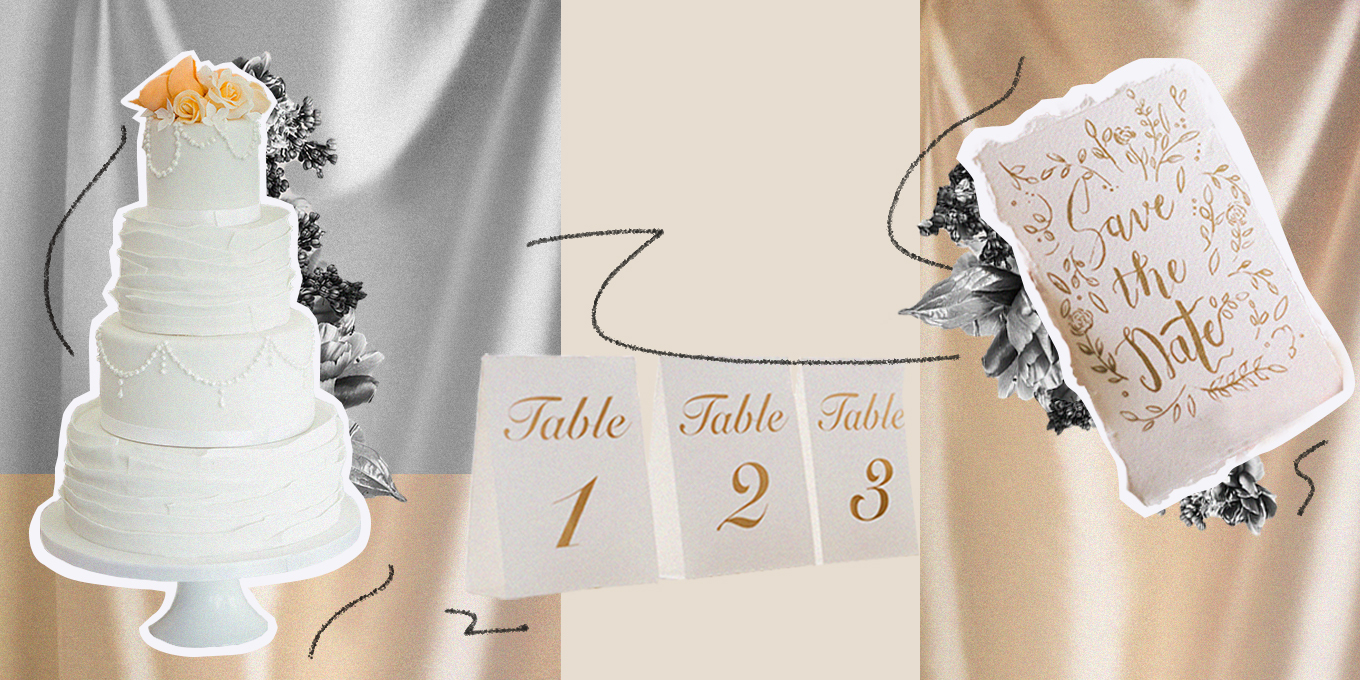Life and Love
5 Questions to Ask If You’re Changing Your Wedding Plans
Here’s how to pivot (and figure out those refunds).
by : Caitlin Kenny- Jun 25th, 2020

Almost any married couple can attest to how trying the wedding-planning process can be, but for 2020 couples, it’s a whole new level of stress. COVID-19 is disrupting countless would-be special days, and all of its uncertainty only compounds the upheaval.
Brides and grooms are stuck trying to predict and plan for what’s to come, while also seeking to minimize their losses. Likewise, the wedding industry has been hit hard by the resulting recession. “Wedding and event professionals might be in the top five most non-essential businesses you can own or run,” says Greg Bell, vice-president and co-owner of Décor and More, one of Canada’s largest event décor firms.
Perhaps predictably then, tensions are high as couples and venues debate refunds and contingency plans. “That’s what all the cases we’re dealing with now are about,” says Samantha F. Glass, managing partner and owner of SFG Paralegal Services in Toronto. “It’s a very hot and very fragile topic from the perspective of both consumers and vendors.”
Need help figuring out the best way forward for your wedding plans? Here, we take you through the major questions to consider on contracts, deposits, disputes and more.
1. Do you want to modify, postpone or cancel?
This first question is the hardest hands down, with so many factors at play. For some couples, getting married on their original date – be it a Zoom wedding or offline elopement – is the priority, whether that stems from a certain significance of the day, aging family members, a desire to be married before having children or simply just to get on with it. Meanwhile, others are opting to push back their date until they can have the celebration they originally envisioned.
Whichever direction you decide to go, start by chatting with your venue first and foremost (as that’s likely where you’ve made your biggest deposit) as well as any other key vendors. “The best way to deal with these issues is having a conversation,” says Glass. “Nothing has to escalate.”
Explore your options with your venue, and, if you can, be mindful of the financial impact they may be facing as well. “Planners and other vendors can still be busy planning a 12-person wedding in a backyard, but these venues built for crowds are really in trouble,” Bell points out. That said, it’s still your day: “Whether you go ahead with it on that date or you don’t, it really is about what you want to do, so don’t be pressured by anybody who is knocking at your door.”
If you decide to postpone, work with your venue to find an alternate date – and don’t pay any sort of rescheduling fee or markup. “If you want to accept a new date, you can do that, but you should say to your vendor, ‘I want the terms of the original contract with an addendum,’” says Glass. “Do not enter a new contract.” The addendum should list the new date, same price and a plan for what will happen if the COVID-19 is still an obstacle when the rescheduled dates comes around.
Similarly, if you want to – and can – stick to your original date and location but with a significantly smaller guest list, Glass recommends renegotiating the terms of your contract (but keeping it aligned to the same per-head pricing) and again, asking for an addendum. If you decide you’d prefer to cancel your booking altogether, you’ll need to take a close look at your contract (more on that in a minute!).
Whatever you do, make sure to loop your guests in as soon as possible, even if your plans aren’t totally finalized. “I’ve seen people sending a ‘this is my save-the-date to save the date,’ and being playful,” says Bell. “Any time when there’s this much uncertainty, if you can layer in some form of levity, it helps.”
2. Will you still celebrate the day?
Many couples who are postponing or cancelling their bigger celebrations are still having a small at-home ceremony on their original date (for tips on how to pull it off, check out our guide to virtual weddings).
If you decide to go with a revised same-day plan, it’s a great opportunity to explore how you might be able to continue working with your vendors. “Suppliers are all doing our version of curbside takeout – maybe providing for 15 mini celebrations on a Saturday – and it’s not making anyone rich, but it’s a lot better than nothing at all,” says Bell. “But if you can’t afford it, do your best DIY and have fun with it.”
Even if there’s no wedding but simply a postponement dance party on Zoom, you can still find ways to shift the situation into a positive one, says Bell: “I’ve seen couples turn it into a philanthropic thing, asking everyone to help crowdfund for something near and dear to them. They’re turning it into a date that’s not about them because their date will be in future.”
3. Is your contract frustrated?
Brides and grooms might be feeling frustrated, but the real question here is whether your contract is frustrated. In the legal world, a frustrated contract is one that can no longer be fulfilled due to unforeseen events outside either party’s control – such as, say, a global pandemic. In this case, neither party is required to uphold the terms of the contract, which means the vendor doesn’t need to provide services and you don’t need to pay. “If there is a service that is not completed because of the pandemic, the consumer should get their deposit back,” says Glass. “The law is very clear on that.”
And that’s even if your contract has what’s called a force majeure clause that states that an “act of God” negates your right to a refund: “I’ve seen some contracts say that even if there’s a pandemic, you won’t get a refund, but case law says otherwise,” says Glass. “Contracts are binding in their intention, but they’re not above the law – the court makes the final decision.”
But here’s the challenge: In order to be frustrated, it has to be impossible for the contract to be completed. In the case of COVID-19, that means government officials need to be officially prohibiting businesses from operating or large groups (specifically, the number of guests stated in your contract) from gathering. What does that mean for a couple whose wedding date is a few months away but the uncertainty has them wanting to cancel now? “Until we know an answer for what the government is mandating us to do, it’s too early and the contract is not actually frustrated,” says Glass. That doesn’t mean you can’t chat with your venue or vendors about alternate arrangements, but you’re not legally entitled to a refund at that point. (Contracts with vendors who can still legally provide their services, such as caterers, DJs and photographers, aren’t frustrated either, so it’s best to negotiate with them directly, too.)
4. Have services been rendered?
Now here’s where the right to a refund becomes less black and white: “Partial services completed is the exemption,” says Glass. Give thought to how much time your vendors or venue might have already put into your wedding, whether that’s organizing, booking rentals or consulting with you. “Where the bride and groom may have a non-understanding of what they’re paying for could be, for example, the 15 hours of work that the planner has put into floor plans, flow or what the custom menu might look like,” says Bell. “All those ideas that we have to make a reality is the R&D time no one really wants to pay for.”
It can be tricky to nail down these behind-the-scenes services, and while it comes down to a case-by-case basis, Glass suggests going back to what your contract says: “It may stipulate what services the venue is going to provide other than just the wedding itself, such as sitting with the bride to plan how things are going to look.”
From there, consider how far along the provider is in the process. “If we’re talking about a couple who planned a year ago and the venue has really put time into doing things, I would say they’re not entitled to getting their deposit back,” says Glass.
It may seem like a murky area but keeping the business’s point of view in mind is important to help you come to a mutual understanding. “Some planners aren’t handling things the way they should, but more often than not, they’re offsetting their time and energy – the R&D work they did for you,” says Bell. “And that is why it’s so good if you can postpone.”
5. Is it worth pursuing legal action?
If you are entitled to a refund but your venue isn’t cooperating, you might consider suing. But at what point does that move make sense? If your deposit is $5,000 or over, estimates Glass. “You have to do a cost-benefit analysis of if it’s actually worth it.” Paralegals like Glass offer lower fees than lawyers (and in Ontario, can take on cases with a value of up to $35,000 per plaintiff), but even then, she estimates that if all goes well, this type of case could cost between $3,000 and $5,000 (though if a party is successful, the court will give back a percentage of the legal fees).
“If it’s a $5,000 case, then it really depends if there are there additional damages,” Glass says, referring to the subsequent costs a couple may incur—and sue for—if their vendor delays returning a deposit (for example, a jacked-up price on a new hall).
Secondly, assess the viability of the business itself. “If you get a judgment against a banquet hall, is it still going to exist aver COVID?” asks Glass. “If the answer is no, don’t waste your time. If they go bankrupt, there’s nothing there.”
If you’re unsure, it never hurts to get professional advice. Find a paralegal or lawyer that offers a free discovery call to run you through the options. Even if you decide on mediation, bringing in a neutral expert can be helpful. “Vendors are raw right now because consumers are saying they have no choice but to give money back,” says Glass. “And consumers are putting emotion into the situation. So, I don’t think the vendor would be offended if a couple brings a third-party in. They might actually be relieved to be talking to someone based on just the facts.”
READ MORE:
Yes, Virtual Weddings Can Still Feel Special – Here’s How
How 5 Brides Rearranged Their Wedding Plans Due to Coronavirus Pandemic – and What it Cost
Newsletter
Join our mailing list for the latest and biggest in fashion trends, beauty, culture and celebrity.
Read Next

Fashion
Tennis Champions Roger Federer and Rafael Nadal Climb a Mountain With Louis Vuitton
An Odyssey of rivals turned friends.
by : Allie Turner- May 18th, 2024

Culture
Two ‘Bridgerton’ Cast Members Are Dating IRL
The Ton is a-twitter with rumours.
by : Rebecca Mitchell- May 17th, 2024

Life and Love
Have You Tried These Goodies for Sexual Wellness Yet?
Consider this your sign that it’s time to improve your sexual well-being—a key part of your overall health.
by : ELLE Canada- May 7th, 2024


